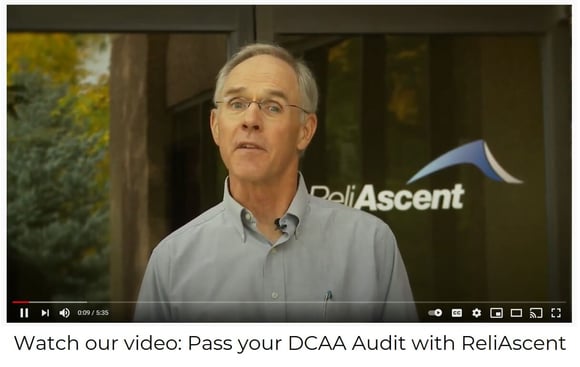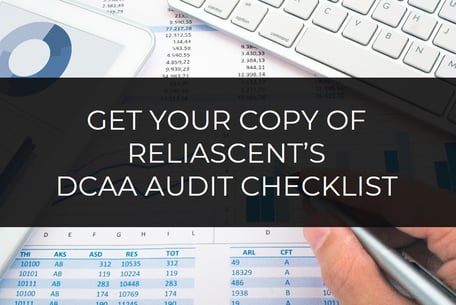- DCAA Compliant Accounting Systems
- Services
- Agency Solutions
- Resources
- Company
- Blog
 Small businesses will encounter several different types of DCAA audits and unfortunately, many are not adequately prepared to face them. While some DCAA audits (like pre-award audits for an SBIR Phase II contract) may not be as involved as others, every audit can be stressful and potentially harmful to your business if not properly prepared for.
Small businesses will encounter several different types of DCAA audits and unfortunately, many are not adequately prepared to face them. While some DCAA audits (like pre-award audits for an SBIR Phase II contract) may not be as involved as others, every audit can be stressful and potentially harmful to your business if not properly prepared for.
Cost reimbursable type awards almost always trigger at least one type of audit, if not more than one. However, many Time & Material or labor grade contracts can also generate the need for a DCAA audit. This is because the Federal Government is more likely to audit a contractor when they perceive the risk to be high enough to warrant their time. The Federal Government will want you to provide assurance that you operate your system consistent with Government regulated accounting procedures (FAR, DFARS, CFR, DCAA, GAAP). Government accounting rules are sometimes very different from accounting principals used in commercial business.
Interacting with the DCAA, auditors from other agencies such as the NIH, or even third party auditors, is very confusing to accountants and non-accountants not familiar with the methodology of Government audits or that have a complete understanding and extensive experience with the Federal Acquisition Regulations (FAR). Should your business be faced with an audit, ReliAscent's experts can provide you with the essential support services you need to get through this difficult process, and can even engage the auditors for you if you desire.
The price a contractor will pay for audit support services can vary greatly depending on the type of audit, the state of their accounting and timekeeping systems (among other things), and even the auditor that is auditing the small business (as anyone who has been through audits knows, all auditors are different, and may even have their own interpretations or ways of reading FAR clauses, or may want to dig deeper than into specific topics, than others).
If a small business is not a current client of ReliAscent®, and would like to engage our support services, we typically will start with a one-time retainer of $2,000, which we bill against (and do not exceed without authorization). All audit support services are billed on an hourly basis. If you are facing a DCAA audit and need our help, contact ReliAscent® today.
The DCAA's Pre-award Audit is perhaps the most common or familiar audit to government contractors. They are typically not as detailed as other DCAA audit types, and it focuses on reviewing your accounting system to verify it is setup to meet all of the FAR and DFARS requirements for an "Acceptable Accounting System." With this audit, the DCAA usually requires a contractor to fill out Standard Form SF1408 as a starting point (to learn more about the SF1408 and DCAA compliance, read our white paper: "A Guide to DCAA Compliant Accounting Systems - Understanding the SF1408"). The DCAA will then review this and the accounting system to see that it has the features and capability to meet the FAR and DFARS requirements, and that the contractor certified on the SF1408. The Pre-award audit does not audit specific records and therefore is not usually a long, drawn out process. Instead, DCAA reports their findings to the Contracting Officer (CO), and if the contractor passes, the CO can release the contract.
 DCAA PRICING PROPOSAL AUDIT
DCAA PRICING PROPOSAL AUDITYour Contracting Officer is responsible for assuring the government and tax payers that the pricing on a proposed contract is fair and reasonable (therefore, they may request an audit of your pricing). If the contract is large enough to exceed the $2 Million threshold set for in the Truth In Negotiations Act (TINA), the contractor is required to submit pricing information along with the proposal. However, in other instances the CO may request this information and a DCAA audit. DCAA may also request additional information supporting your proposal pricing (typically referred to as Basis of Estimate (BOE)).
Occasionally, the Government contracting officer can even request that the DCAA review an SBIR proposal cost to verify that proposed costs are reasonable and allocable. This review, or audit, is often conducted as an on-site visit by a DCAA auditor who asks for information (such as indirect rates backup). The audit typically causes great concern for awardees, and can even result result in a decrease in the price of your proposal, unless our experts get involved. ReliAscent® knows how to deal with the DCAA, and can support your business through every audit you may face.
Several months into the period of performance (typically 6 - 12), the DCAA will perform an Accounting System Audit. This is a very detailed audit of your accounting system (much more complex and intensive than a Pre-award audit). This type of DCAA audit is designed to verify the operation of an acceptable accounting system, and it does so by auditing a sample of your records to verify proper operation of your system. An SBIR/STTR Ph II awardee will almost always have one of these audits during the performance of the Phase II.
While they are intensive and stressful, when your business uses ReliAscent® to install and maintain your accounting system in compliance throughout the duration of the contract, you can be assured that our accounting team will help you to pass the audit with as little disruption to your business as possible.
Your Incurred Cost Report (also known as the DCAA ICE Submission), is the financial representation of both your direct and indirect costs of work that was performed during your FY. The ICE is used to ensure that your claimed actual costs and billed costs reconcile (simply put: make sure you did not overbill the government, and if so, how much you will need to repay them). The DCAA uses the ICE to ensure that contractors are following the requirements set forth in the FAR, and that their accounting system GAAP compliant.
Incurred Cost Reports are required to be submitted to the government 6 months after the end of the contractor's fiscal year for cost reimbursable type contracts. The DCAA will audit the incurred cost reports, and given the complexity and importance of your incurred cost reports, these can be extremely stressful and difficult for contractors. Again, here, as with other DCAA audit types, having well written policies and procedures for your job cost accounting and timekeeping systems, and then maintaining DCAA compliance, is critical to ensure your organization can pass an ICE audit. ReliAscent® can not only help you prepare your Incurred Cost Report, but our experts can guide you throughout the audit process and help to ensure it is as smooth and painless as possible.
The DCAA's Floor Check audit is usually an unannounced visit to your facility by the DCAA. The purpose of the audit is to verify the existence of your employees and to determine whether adequate timekeeping controls and practices are in place and functioning properly. Essentially, the DCAA is ensuring that employees are at work, performing the assigned job classification and time (labor) charged to the proper cost objective. They will ask to visit the workstation of several employees, picked at random, to verify they are using labor recording and timesheets properly. It also will verify that the contractor has procedures covering labor recording, the procedures are familiar to the employee and that employees are at their work station when performing work.
Two of the most common ways a contractor can fail a Floor Check audit is to either 1) not have a DCAA compliant, written timekeeping policy and procedure, and 2) the DCAA will find violations or errors in your standard training procedures for employees regarding time tracking and attendance, and how these things are documented.
By setting up our clients with a DCAA compliant timekeeping system (which is then mapped back to the QuickBooks general ledger), and providing them with training, policies and procedures, and ensuring your business understands and properly maintains your timekeeping system and processes, ReliAscent's accounting teams can better position a contractor to easily pass a Floor Check audit.

If you are in the middle of an audit, have a pending audit, or would like to learn more about our DCAA Audit Support services, please contact us immediately. Time is a factor and your no small business should face an audit without expert support.
For a compete listing of all of ReliAscent's government contract accounting and DCAA compliance white papers, visit our White Papers Library, and be sure to subscribe to our Blog and White Papers distribution list here. ReliAscent® publishes multiple posts annually on DCAA audit related topics, including audit descriptions, tips, and insights into the DCAA's procedures and processes.